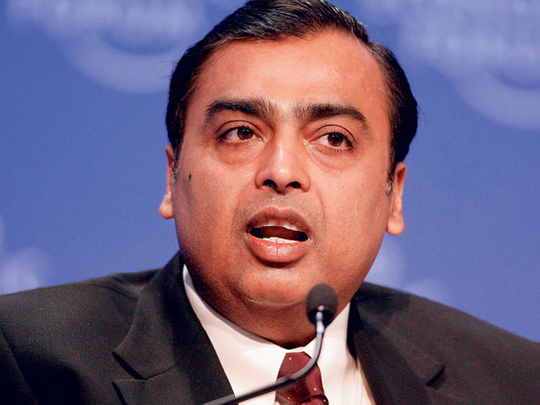
Mumbai: Shares of Reliance Industries rise after reports say India's highest court has ruled in its favour in a dispute over the price of natural gas from India's largest known deposit.
The case pits billionaire Mukesh Ambani, who controls Reliance Industries, against his younger brother Anil.
Reliance shares were up 3.6 per cent, while shares in Anil's Reliance Natural Resources fell 16.8 per cent.
The case tested the government's control of India's natural resources against the sanctity of a private business contract. The Supreme Court came down squarely in favor of the state in a decision that could set an important precedent and help end a five-year fight that has slowed oil and gas production in energy-hungry India.
"Today the Supreme Court has unambiguously ruled that the government is the absolute owner, the constitutional owner, the sovereign owner of gas," additional solicitor general Mohan Parasaran, who represented the government in the case, told reporters outside the courthouse in New Delhi. "It has got absolute rights to regulate the sale of gas."
The ruling favors Mukesh's Reliance Industries, which hoped to nullify a 2005 family agreement because it hadn't been approved by the government. The family agreement obliged Mukesh to sell gas to his brother Anil's company, Reliance Natural Resources, at half the government-set rate.
The court also gave the feuding brothers six weeks to renegotiate their contract.
Parasaran said that for the purposes of those negotiations, the price set by the family agreement is "no longer valid."
"They have to take into account the governmental price," he said.
That could mean a windfall for Mukesh, already one of India's richest individuals. Reliance Industries has calculated that it could make $11.5 billion from the gas if it's priced at the current government rate - avoiding a $5.4 billion loss that would have resulted from the family price.
For Anil, the cost of losing the case could be even higher. The gas supply contract, he told shareholders in July, is "our company's primary asset and contributes most of its value." The verdict calls into question not just how much he might pay for gas from the basin, but how much gas he will get at all.
Anil can ask the Supreme Court to review the verdict but there is no higher court for him to appeal to.
Shares of Reliance Industries - India's most valuable company - rose over 3 per cent on the news, while shares in Anil's Reliance Natural Resources plummeted more than 25 per cent, before recovering to 54.1 rupees a share - a 20.1 per cent slide - in midday trade in Bombay.
"The court has asked us to renegotiate," Reliance Industries executive director P.M.S. Prasad told reporters. "That is what we are going to do."
Officials from Reliance Natural Resources couldn't be reached for immediate comment.
The dispute exposed weaknesses in India's oil and gas sector, which is dominated by a few large players and lacks an independent regulator to oversee wholesale gas pricing.
It has also tested the boundaries between government and big business in a country where powerful dynasties like the Ambanis often enjoy close ties with politicians.
The bickering began after the Ambani patriarch, Dhirubhai - who was one of India's first great capitalists - died without leaving a will to specify how his sprawling empire should be divided.
In 2005, his wife brokered a family agreement, allocating core oil and gas interests to Mukesh, while reserving power, telecom, entertainment and financial services assets for younger brother Anil.
As part of that deal, Anil was to get cheap gas for his power company from Mukesh.
After the price of gas rose, the brothers went to court.
The resulting imbroglio eventually drew in top officials in India's powerful Ministry of Petroleum & Natural Gas.
Anil issued a weeklong series of front page newspaper advertisements lambasting the government for allowing his brother to rake in "super-normal" profits, accusing top officials of inappropriately accepting favors.
Petroleum minister Murli Deora told the Press Trust of India Friday that he welcomed the Supreme Court's verdict.
"No matter what campaign one ran against the government, the nation is supreme," he said.












